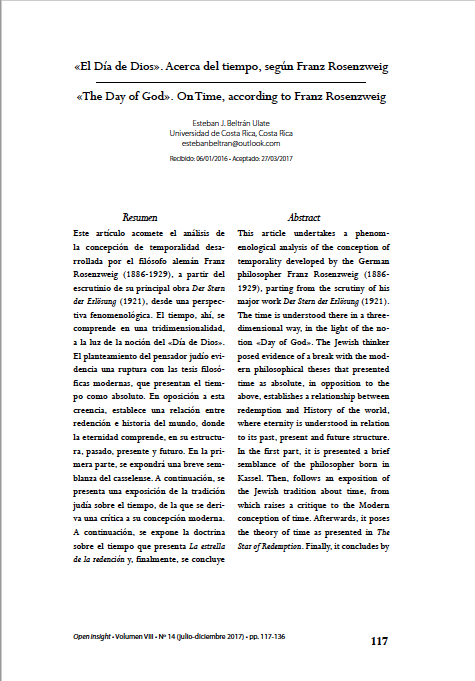«The Day of God». On Time, according to Franz Rosenzweig
Abstract
Received: 06/01/2016 • Accepted: 27/03/2017 This article undertakes a phenomenological analysis of the conception oftemporality developed by the German philosopher Franz Rosenzweig (1886-1929), parting from the scrutiny of his major work Der Stern der Erlösung (1921). The time is understood there in a threedimensional way, in the light of the notion «Day of God». The Jewish thinker posed evidence of a break with the modern philosophical theses that presented time as absolute, in opposition to the above, establishes a relationship between redemption and History of the world, where eternity is understood in relation to its past, present and future structure. In the first part, it is presented a brief semblance of the philosopher born in Kassel. Then, follows an exposition of the Jewish tradition about time, from which raises a critique to the Modern conception of time. Afterwards, it poses the theory of time as presented in The Star of Redemption . Finally, it concludes by showing the relation between temporality and eternity as understood by Franz Rosenzweig.References
Balcarce, G. (2010). “Franz Rosenzweig y la anticipación de la eternidad”. Cuadernos de Filosofía (55): 117-140.
Batnitzky, L. (2000). Idolatry and Representation. New Jersey: Princeton University
Press.
Bertolino, L. (2000). “La filosofía del nulla in Fran Rosenzweig”. Annuario Filosofico
(16): 257-287.
Blond, Louis. 2010. “Franz Rosenzweig: Homelessness in Time”. New German Critique Fall (37): pp27-58.
Casper, B. (1998). Das Ereignis des Betens. Grundlinien einer Hermeneutik des religiösen Geschenhens. Frieburg, München: Alber.
Dussel, E. (1996). Filosofía de la Liberación. Bogotá: Nueva América.
Eliade, M. (1954). Cosmos and History, The myth of the eternal return. New York: Harper Touchbooks.
Garrido-Maturano, Á. (2010). Ensayo sobre el sentido filosófico, cosmológico y religioso del tiempo. Buenos Aires: Biblos.
Garrido-Maturano, Á. (2004). “El tiempo que acontece por sí mismo”. Thémata (32): pp 99-118.
Gershom, S. (2012). “On Franz Rosenzweig and His Familiarity with Kabbala Literature”. Naharaim (6,1): 1-6.
Heidegger, M. (2012). Ser y tiempo, J.E. Rivera, trad. Madrid: Trotta.
Lucca, E. (2012). “Gershom Scholem on Franz Rosenzweig and the Kabbalah. Introduction to the Text”. Naharaim, (6-1): pp 7-19.
Lévinas, E. (2016). Totalidad e Infinito, M. García-Baró, trad. Salamanca: Sígueme.
Navarrete, R. (2015). Franz Rosenzweig y la crisis del historicismo alemán. Pensamiento (71)256: pp117-135.
Petrarca, G. (2015). “La communauté et le reste. Sur Franz Rosenzweig”. Les Cahiers Philosophiques de Strasbourg 1: pp 9-28.
Rosenzweig, F. (1999). Understanding the Sick and the Healthy: a view of World, Man and God, N. Glatzer, trad. Cambridge: Harvard University Press.
Rosenzweig, F. (2006). La estrella de la redención, M. García-Baró, trad. Salamanca: Sígueme.
Taub, E. (2011). “Universalidad y mesianismo: para una teología política desde el pensamiento de Hermann Cohen”. Revista Pléyade (8): pp 85-102.
Toscano, J. (2014). “Rosenzweig: la temporalidad de la redención como principio teológico-político”. Areté 26 (1): pp 53-76.





